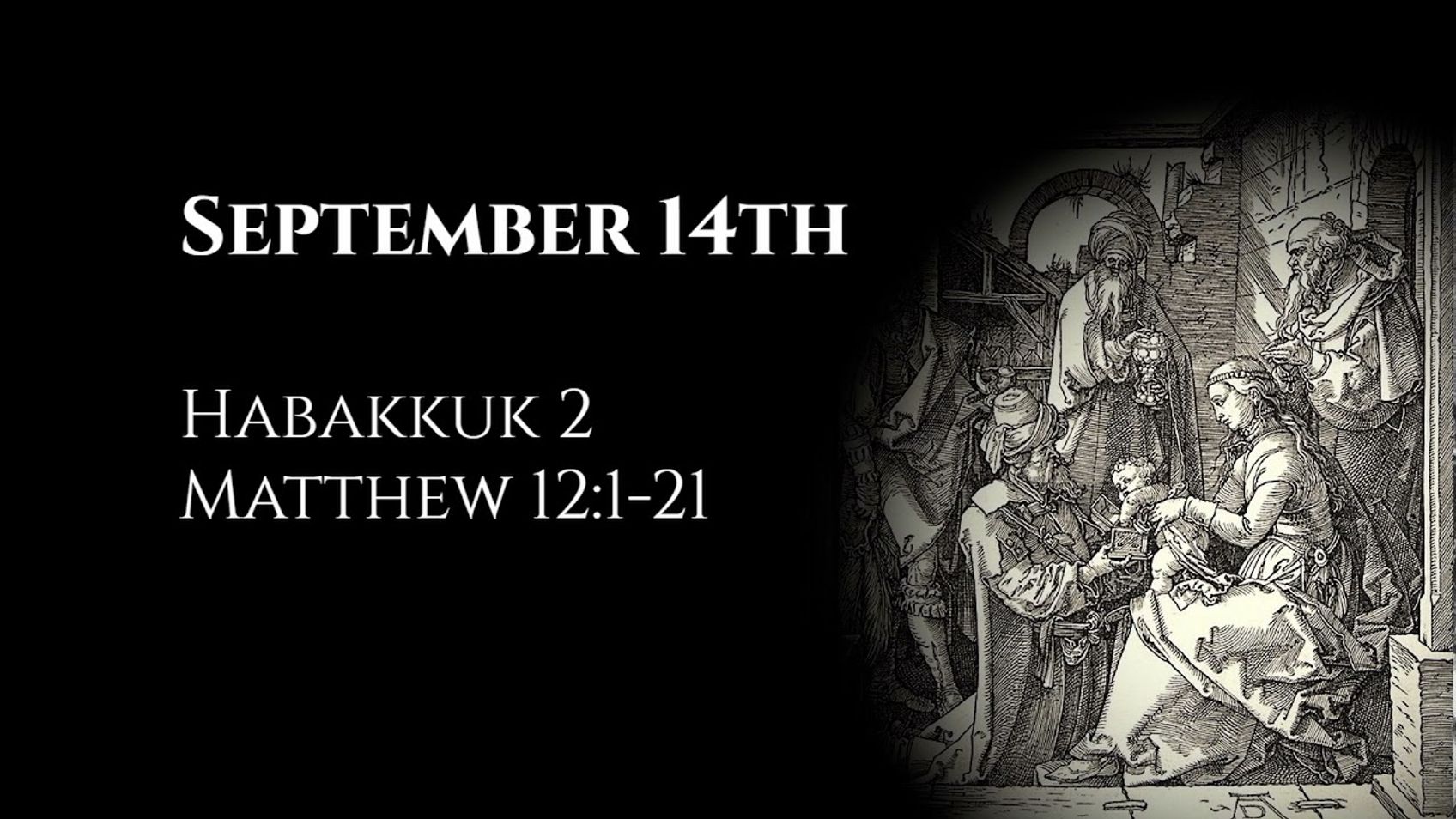September 14th: Habakkuk 2 & Matthew 12:1-21
September 13, 2021

Alastair Roberts
The vision of the downfall of the proud Babylonians. Sending out the twelve apostles. Jesus is the Lord of the Sabbath.
My reflections are searchable by Bible chapter here: https://audio.alastairadversaria.com/explore/.
If you are interested in supporting this project, please consider supporting my work on Patreon (https://www.patreon.com/zugzwanged), using my PayPal account (https://bit.ly/2RLaUcB), or buying books for my research on Amazon (https://www.amazon.co.uk/hz/wishlist/ls/36WVSWCK4X33O?ref_=wl_share).
You can also listen to the audio of these episodes on iTunes: https://itunes.apple.com/gb/podcast/alastairs-adversaria/id1416351035?mt=2.
More From Alastair Roberts
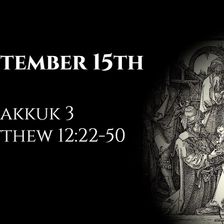
September 15th: Habakkuk 3 & Matthew 12:22-50
Alastair Roberts
September 14, 2021
The prayer of Habakkuk. Addressing an evil generation.
My reflections are searchable by Bible chapter here: https://audio.alastairadversaria.com/expl
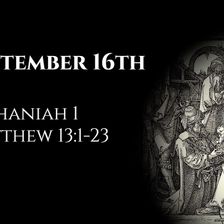
September 16th: Zephaniah 1 & Matthew 13:1-23
Alastair Roberts
September 15, 2021
The coming Day of the Lord. The Parable of the Sower.
My reflections are searchable by Bible chapter here: https://audio.alastairadversaria.com/explo
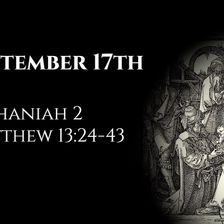
September 17th: Zephaniah 2 & Matthew 13:24-43
Alastair Roberts
September 16, 2021
The Day of the Lord comes upon the nations. The Parable of the Tares.
My reflections are searchable by Bible chapter here: https://audio.alastairadve
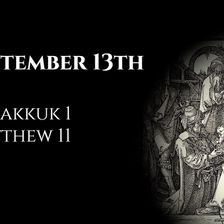
September 13th: Habakkuk 1 & Matthew 11
Alastair Roberts
September 12, 2021
Habakkuk's dismay at the rise of Babylon. Messengers from John.
My reflections are searchable by Bible chapter here: https://audio.alastairadversaria
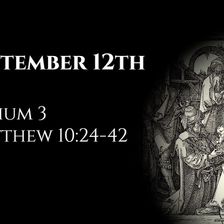
September 12th: Nahum 3 & Matthew 10:24-42
Alastair Roberts
September 11, 2021
The justice of Nineveh's overthrow. The lot of the disciple.
My reflections are searchable by Bible chapter here: https://audio.alastairadversaria.co

Christian Reconstruction in the Pacific Northwest (with Crawford Gribben)
Alastair Roberts
September 11, 2021
Crawford Gribben, author of the book 'Survival and Resistance in Evangelical America: Christian Reconstruction in the Pacific Northwest' (https://amzn
More on OpenTheo

Christmas Cranks and Christmas Blessings with Justin Taylor and Collin Hansen
Life and Books and Everything
December 17, 2025
If you are looking for a podcast where three friends talk about whatever they want to talk about and ramble on about sports, books, and grievances, th

Why Does the Bible Teach You How to Be a Proper Slave Owner?
#STRask
November 13, 2025
Question about why it seems like the Bible teaches you how to be a proper slave owner rather than than saying, “Stop it. Give them freedom.”
* It s

Life and Ministry in Charlotte and in the SBC with Clint Pressley
Life and Books and Everything
December 15, 2025
In a rare cultural anomaly that may never be repeated in our lifetimes, the current SBC President and current PCA Moderator live in the same neighborh

Why Should We Pray If God Already Knows What’s Going to Happen?
#STRask
January 29, 2026
Questions about why we should pray if God already knows what’s going to happen, how the effectiveness of prayer is measured, and whether or not things

When I Can’t Stop Thinking About Something, Is That God Speaking?
#STRask
December 1, 2025
Questions about whether having a recurring thought is an indication God is speaking to you, what to say to someone who says they sinned because “God t

Did Jesus Prove He Wasn’t Sinless When He Overturned the Tables?
#STRask
December 29, 2025
Questions about whether Jesus proved he wasn’t sinless when he overturned the tables, whether Jesus’ response to the Pharisees in Mark 3:22–26 was a b

Is Greg Placing His Faith in the Wrong Thing?
#STRask
February 12, 2026
Questions about Greg placing his faith in his personal assessment of which truth claims best match reality rather than in the revelation of God in Jes

Does God Hear the Prayers of Non-Believers?
#STRask
February 26, 2026
Questions about whether or not God hears and answers the prayers of non-believers, and thoughts about a church sign that reads (as if from God), “Just

Could the Writers of Scripture Have Been Influenced by Their Fallen Nature?
#STRask
October 23, 2025
Questions about whether or not it’s reasonable to worry that some of our current doctrines were influenced by the fallen nature of the apostles, and h

Are Demon Possessions and Exorcisms in the New Testament Literal?
#STRask
December 11, 2025
Questions about whether references to demon possessions and exorcisms in the New Testament are literal, how to talk to young children about ghosts, an

Is 1 Corinthians 12:3 a Black-and-White Tool for Discernment?
#STRask
October 27, 2025
Questions about whether the claim in 1 Corinthians that “no one can say ‘Jesus is Lord’ except in the Holy Spirit” is a black-and-white tool for disce

Why Is It Necessary to Believe Jesus Is God?
#STRask
February 19, 2026
Questions about why it’s necessary to believe Jesus is God, whether belief in the Trinity is required for salvation, and why one has to believe in the

What Is the Role of the Holy Spirit in Our Lives if He Doesn’t Give Us Instructions?
#STRask
February 23, 2026
Questions about the role of the Holy Spirit in our lives, advice for someone who believes in God intellectually but struggles to understand how to hav

How Can We Know Who Is Teaching the Same Gospel Paul Taught?
#STRask
February 16, 2026
Questions about how we can know who is teaching the same gospel Paul taught, and whether or not Jeremiah 1:5 supports the idea that we pre-existed in

Can You Recommend Good Books with More In-Depth Information and Ideas?
#STRask
January 22, 2026
Questions about good books on Christian apologetics, philosophy, and theology with more in-depth information and ideas, and resources to help an intel
